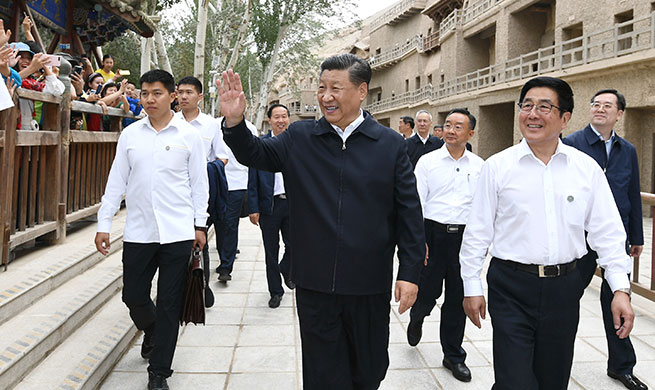ISLAMABAD, Aug. 19 (Xinhua) -- Pakistani analysts said Sunday that the United States tries to cow other countries into submission by bullying China with hegemonic tactics including more tariffs.
"By bullying China, the United States has also been showing hegemonic threats to other countries, giving a hidden message that if anyone does not follow its policy it would be dealt with like China," said Saeed Chaudhry, director of the Islamabad Council for International Affairs.
The United States has adopted the wrong path by obtaining financial advantages with such tricks as ramping up political pressure and sacrificing the rights of developing countries, said Chaudhry in an interview with Xinhua on Sunday.
Chaudhry said that the United States has been experiencing a tough economy at home and a shrinking slice of the global market, which frustrated U.S. President Donald Trump, and Trump therefore provoked trade frictions with China.
The Trump administration has no solution for the United States' own financial problems or others'. Instead of seeking cooperation, the Trump administration has launched a series of bizarre and weak tactics against others, producing collateral damage for U.S. interests at home and abroad, he said.
A recent report by the Federal Reserve Bank of New York showed that the U.S. tariffs on imports have increased the costs of doing business in the United States, including higher prices and lower profits for the manufacturing and service industries.
The U.S.-imposed trade frictions with China have also created uncertainty worldwide, with countries in the Global South affected the most.
In Democratic Republic of Congo and Zambia, 4,400 jobs and a big portion of mining revenues were about to vanish when the Anglo-Swiss mining giant Glencore moved to shut down cobalt and copper mines there.
The 13-month-long trade frictions are partly responsible for weakening demand for mining products, analysts told the South China Morning Post this week.
The U.S. tactics of blackmailing China by using sabotage and politically motivated actions, however, have almost failed, thanks to the sustainability of the Chinese economy, said John Ashbourne, a senior analyst at the London-based consultancy Capital Economics.
"China is a big country with a huge economy but it has never shown any sign of hegemonic approach or bullied other countries for its own gains," Ashbourne said, adding that the two sides need to mend the issue through negotiations.
Mohammad Jamil, a senior columnist from Pakistan's eastern city Lahore, told Xinhua that last month on the sidelines of the G20 summit in Japan, Trump promised not to impose additional tariffs, and to restart economic and trade consultations with China, creating hope that the world economy would regain stability. Unfortunately, Trump went back on his words.
Trump's walking back repeatedly on his commitments and wielding the tariff stick on imports from China in September have made the U.S. and world economy more volatile, said Jamil.
Chaudhry stressed that the world needs to understand that by resisting the unilateral practices, China is actually making efforts to defend the development rights of all countries amid globalization, and serve as a facilitator to the developing economies.
He urged Washington to shun selfishness and join global economic and development activities based on fairness so as to avoid another global crisis.

















